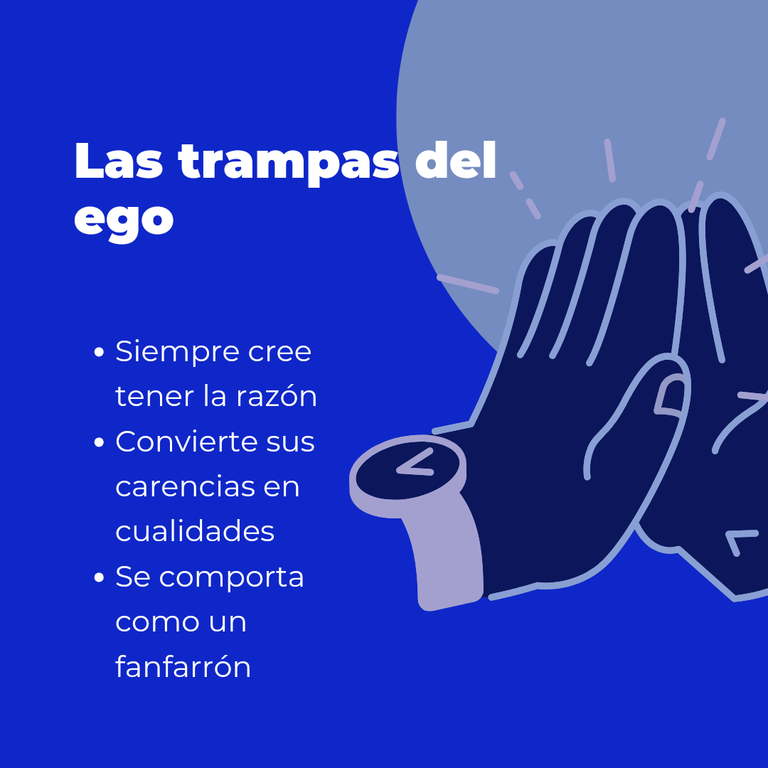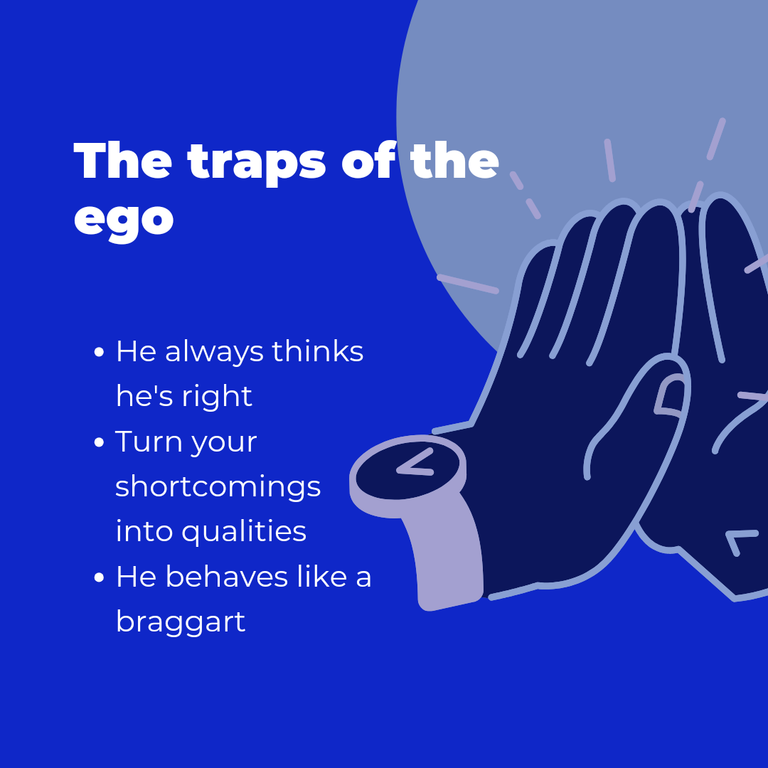Las trampas del ego/ESP-ENG
Hace unos cuantos años, los cursos y talleres sobre autoestima era prácticamente una moda y las conversaciones entre equipos de trabajo tenían que ver con eso. A cualquier persona se le acusaba de tener baja estima cuando rompía los moldes impuestos. Creo con firmeza que se abusó del término.
Alguna gente, sin tener las credenciales o las competencias necesarias aceptaba cargos, cambios de funciones o nuevos proyectos sin saber cómo hacerlo, con ello asumía que tenía una alta valoración de sí misma. Recuerdo una persona que aceptó dar unas horas de inglés en un liceo, sin manejar el idioma. Al tiempo le cambiaron de asignatura, era necesario.

Mucha altivez salió a flote, el problema más grande reside en la dificultad, que tiene el ególatra, para tomar distancia de la situación y, objetivamente, verse a sí mismo, lejos de la trampa del ego.
Siempre me pregunté, qué movía a alguien a asumir una responsabilidad sin ser competente para ella. La falsa autoestima, el no asumir carencias para buscar mejor preparación, pero sobre todo un ego desmesurado, que le obligaba a proyectarse como un súper humano, un sabelotodo muchas veces fanfarrón.
El ego puede convertirse en un tirano cruel, que doblega a sí mismo y a los que están relacionados con él. No poder ver las propias carencias sino exaltarlas y convertirlas en cualidades es un grave problema. Esas personas que se atribuyen logros, se adornan con pedantería, exageran en alabarse permanentemente, pueden caer fácilmente en el narcisismo.
Existe también la tendencia a pedir la evaluación del otro, actividad que ellos poco hacen de manera positiva, casi siempre los demás son mediocres a sus ojos, les cuesta lo que popularmente se dice: "ver ojos bonitos en cara ajena.
El ego puede ser malvado al dar un falso dictamen de autoestima cuando lo contrario es lo que hay. En el fondo la persona cae en cuenta de su error, se deprime y se vuelve abusador con sus principales allegados, habrás escuchado también la frase: "luz en la calle y oscuridad en la casa".
Le cuesta mucho asumir que tiene problemas, y muchas veces su ejemplo es aleccionador para los demás, al nunca desear ser como él, podríamos decir que enseña de manera inversa. Él escuchará las recomendaciones, quizá las lea o las vea en vídeos pero su resistencia al cambio solo le hará reforzar su manera de ser.
Aprender a ser autocrítico es un proceso lento, que requiere ayuda de especialistas y sobre todo la aceptación a recibirla de la propia persona.

Fuente: Galería de gifs de Peakd
Es necesario reconocer que todos caemos en la trampa del ego de una u otra forma. A veces nos ponemos de ejemplo, «yo hago», «yo soy», «yo siento que...», con la convicción de que así debe actuar al otro. O damos algo y lo perifoneamos con orgullo. También puede ocurrir que interrumpamos constantemente o que sintamos que siempre tenemos la razón y juzguemos el comportamiento de los demás, pero afirmemos «a mí no me gusta juzgar».
Ese ego odioso se expondrá y proyectará la imagen, que muy en el fondo no queremos tener, cuando tenemos consciencia de ello y podemos darnos cuenta: quienes asumimos el compromiso con nosotros mismos de tener una vida equilibrada necesitamos revisar si no estamos cayendo en estas trampas.
Gracias por tu amable lectura.
Mi contenido es original.
He utilizado el traductor de Google
Gifs de Peakd con sus respectivas fuentes.
Imagen principal diseñada en Canva.

English Version
A few years ago, courses and workshops on self-esteem were practically a fad and conversations between work teams were all about that. Anyone was accused of having low self-esteem when they broke the imposed molds. I firmly believe that the term was abused.
Some people, without having the necessary credentials or skills, accepted positions, job changes or new projects without knowing how to do it, thereby assuming that they had a high opinion of themselves. I remember a person who agreed to give a few hours of English at a high school, without speaking the language. After a while, they changed his subject, it was necessary.

A lot of haughtiness came to the surface, the biggest problem lies in the difficulty that the egomaniac has to distance himself from the situation and, objectively, see himself, far from the trap of the ego.
I always wondered what moved someone to assume a responsibility without being competent for it. False self-esteem, not assuming deficiencies to seek better preparation, but above all an excessive ego, which forced him to project himself as a super human, a know-it-all who is often boastful.
The ego can become a cruel tyrant, subduing itself and those who are connected to it. Not being able to see one's own shortcomings but instead exalting them and turning them into qualities is a serious problem. Those people who attribute achievements to themselves, adorn themselves with pedantry, exaggerate in their constant praise, can easily fall into narcissism.
There is also the tendency to ask for the evaluation of others, an activity that they rarely do in a positive way, almost always others are mediocre in their eyes, they find it difficult to do what is popularly said: "see pretty eyes in another's face."
The ego can be evil by giving a false opinion of self-esteem when the opposite is true. Deep down, the person realizes his mistake, becomes depressed and becomes abusive with his closest friends, you will have also heard the phrase: "light in the street and darkness in the house."
It is very difficult for him to accept that he has problems, and many times his example is instructive for others, as he never wants to be like him, we could say that he teaches in the opposite way. He will listen to the recommendations, perhaps read them or see them in videos but his resistance to change will only reinforce his way of being.
Learning to be self-critical is a slow process, which requires help from specialists and above all the acceptance of receiving it from the person himself.

Source: Peakd gif gallery
It is necessary to recognize that we all fall into the ego trap in one way or another. Sometimes we set an example for ourselves, “I do,” “I am,” “I feel that…”, with the conviction that this is how others should act. Or we give something and proudly announce it. It may also happen that we constantly interrupt or feel that we are always right and judge the behavior of others, but we say “I don't like to judge.”
That hateful ego will be exposed and project the image that deep down we do not want to have, when we are aware of it and can realize: those of us who make the commitment to ourselves to have a balanced life need to check if we are not falling into these traps.
Thank you for your kind reading.
My content is original.
I have used Google translator
Gifs from Peakd with their respective sources.

Gracias
Lo peor que hay es un narcisista, estar al lado de personas te agota espiritualmente, te roban la energía, he conocido a varias personas así y me alejo de ellos de inmediato, la soberbia les gana.
Tal como lo dices, es así, roban la energía, agotan, todo lo ven desde su óptica e imponen sus creencias como que esa es la única verdad.
Hay que marcar distancia por salud mental. Gracias por tu lectura.
Saludos
@tipu curate 8
Upvoted 👌 (Mana: 0/75) Liquid rewards.
Muy acertsdo tu entrada! Un gusto leerla. Gracias por compartir
Gracias a ti por la visita.